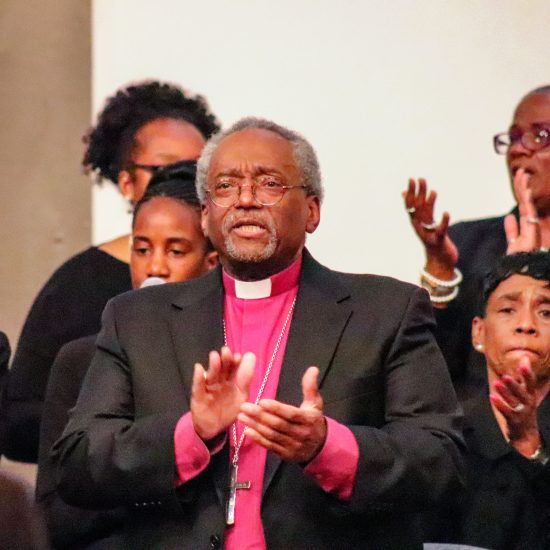HOUSTON (ABP) — Southern Baptists experienced little antagonism during their annual convention in Houston last week — a phenomenon that surprised some and delighted most SBC officials and messengers.
There were plenty of opportunities for controversy. Debates ensued — but remained cordial — during consideration of high-profile resolutions combating child sexual abuse, promoting mental health and responding to the Boy Scouts’ new policy on gay members.
Some thought the report on Calvinism in the convention would ignite simmering tensions.
But none of that happened, and there were different theories as to why.
Richard Land proposed that SBC President Fred Luter’s unopposed run for a second term dampened po-tential discord.
“The only concern for me was the low attendance, which surprises me in Houston,” the outgoing president of the Ethics and Religious Liberty Commission told ABPnews.
The unofficial attendance for the Tuesday and Wednesday gathering was just under 5,200 messengers, which is down from around 7,800 last year in New Orleans. But it’s still more than about 4,800 in Phoenix in 2011, according to Bap-tist Press figures.

SBC Executive Committee president Frank Page gives a report on the first day of the convention’s annual meeting. (BP photo by Van Payne)
|
A possible explanation for low attendance in Houston may also explain why the convention went so smoothly this year, Land said: Southern Baptists are united in fighting cultural trends instead of each other.
“Southern Baptists weren’t upset with fellow Southern Baptists about anything,” he said.
If that’s the case, some rank-and-file messengers said, Executive Committee president Frank Page has to get the credit for that.
“He had a very big hand in keeping everybody together,” said messenger Robert An-derson, pastor of Colonial Baptist Church near Balti-more.
Page did that by appointing an advisory group of leading Calvinist and non-Calvinist Southern Baptists to find ways to bridge that theological gap.
Their ensuing report, “Finding a Way Forward” was presented and discussed in a question-and-answer session during the convention’s Pastors Conference the day before the annual meeting opened.
That report and presentation were “brilliant,” Anderson said, because it models an agree-to-disagree approach that puts the focus on the gospel and evangelism.
The process “re-minded us what our common purpose is,” he said. “Otherwise, Calvin-ism can be one more thing to divide us.”
That unity enabled the convention to speak to the SBC’s roughly 45,000 churches, and to the wider society, with a unified and compassionate voice on some of the most pressing issues of the day, said Russell Moore, the new president of the ERLC.
The Scouting resolution took “a balanced, middle way” that offers support to churches that want to quit Scouts, and those that want to stay, Moore said during a Wednesday press conference.
It did not, he added, “call fire down from heaven” on the BSA, as some had probably expected.
“Many in our culture were expecting a caustic response” to the Scouts’ decision to permit boys with homosexual orientations to join the organization, Moore said.
Through other resolutions, the convention decided to stand with prisoners, the mentally ill and victims of human trafficking, he said.
“I think it was a signal to the culture, and a reminder to ourselves, of what’s important,” Moore said.
Even some who were initially skeptical that messengers would do the right thing left Houston feeling otherwise.
Peter Lumpkins, au-thor of the resolution urging Southern Bap-tists to take child sexual abuse more seriously, said he thought the measure would never make it out of committee.
Lumpkins, a pastor and messenger from Georgia, said he was disappointed when the resolution emerged from the committee without an original provision asking denominational leaders to distance themselves from outside figures implicated in sexual abuse scandals.
It was a reference to Al Mohler, president of South-ern Baptist Theological Sem-inary, and Mark Dever, senior pastor of Capitol Hill Baptist Church in Washington, lending public support to a Calvinist leader accused in a lawsuit of covering up child sexual abuse.
But Lumpkins successfully proposed an amendment re-inserting the language.
“We have been pounded as Southern Baptists on this issue, saying we are unconcerned or that we protect child molesters,” Lumpkins said. “I don’t think that’s who Southern Baptists are.”
Approval of the resolution, he added, “expresses what Southern Baptist’s believe about this and it carries a moral force with it.






